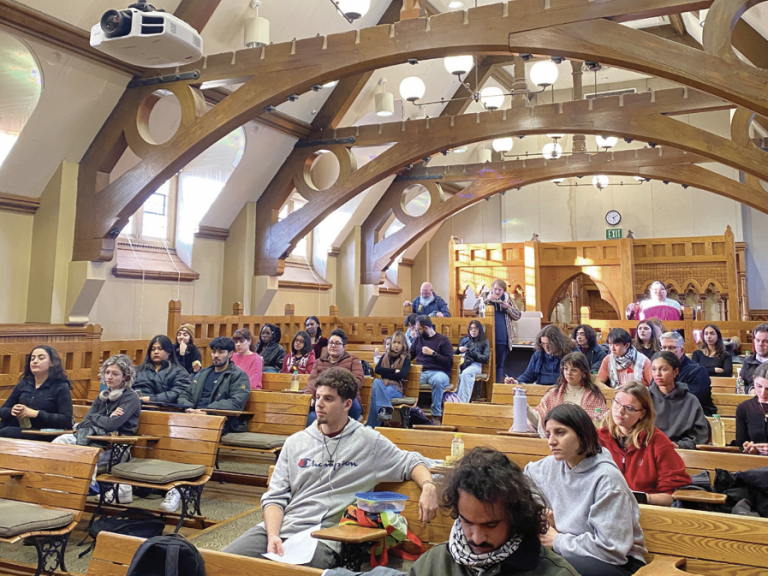Lucy Sheldon ’27
Staff Writer
As Vice President Kamala Harris and former President Donald Trump faced off at the Convention Center in Philadelphia, Pa. for their first presidential debate, Trinity College students gathered in the McCook auditorium with snacks and bingo cards to take in the spectacle for a watch party hosted by the Political Science Club.
As the night wore on, and each candidate took opportunities to bait and insult each other, Trinity Students audibly reacted to some of the more uninhibited attacks and comments. In particular, Harris’ claim that “people start leaving his rallies early out of exhaustion and boredom,” and her mention of Trump’s 34 felony counts earned some laughs. Alternatively, Trump’s response to Harris’ assessment of his crowd sizes earned comments and engagement from the crowd in McCook. This engagement was especially prevalent when Trump claimed that the people at his rallies are in attendance because of their concerns about World War III, increased immigration and alleged incident (which was fact-checked as incorrect in real time) regarding Haitian immigrants in Springfield, Ohio eating local pets.
As the two candidates presented their visions for the future of the United States, Harris infused optimism in her plans, emphasizing her goals of creating an opportunity economy, codifying Roe v. Wade, winning the competition for the 21st century in AI and quantum computing, investing in alternative energy sources and strengthening the United States domestic oil production. Alternatively, Trump was critical in his view of current-day America, focusing on inflation rates, the decline of unions, the future of fracking and the alleged surge in crime.
On Sept. 11, the day after the debate, the Political Science club and Pi Sigma Alpha club sponsored a panel of students and faculty to analyze the debate and evaluate each candidate’s performance. The speakers included Political Science professor Dang Do, accompanied by students Catherine Wallace and Surya Raye.
A key takeaway Raye communicated was that Harris attacked Trump far more frequently and effectively than Trump was able to criticize his opponent. Raye commented on how Trump’s answers often ran long and were unclear. Instead of emphasizing Harris’ role in the current administration or focusing on her policy change since becoming Biden’s vice president, Trump name-called and digressed from several points.
Wallace considered how the candidates’ body language and composure contributed to their performances. Harris pointedly looked at the camera when addressing the American people, looked at the moderators when speaking with them and directed her focus to Trump when talking to him. Wallace noted that Trump did not do the same. Additionally, Wallace mentioned how Harris frequently tied in her campaign slogan of turning the page throughout the debate, creating cohesion among her many responses.
Professor Do capped off the panel with his analysis, focusing primarily on the gender dynamics at play during the debate. Do noted that Trump repeatedly spoke over Harris, managing to accumulate a total of five extra minutes of speaking, according to CNN. Considering reproductive rights is one of the foremost issues on the ballot for 2024, Do noted that Trump’s chauvinistic decorum could have been a deficit to his campaign.




+ There are no comments
Add yours